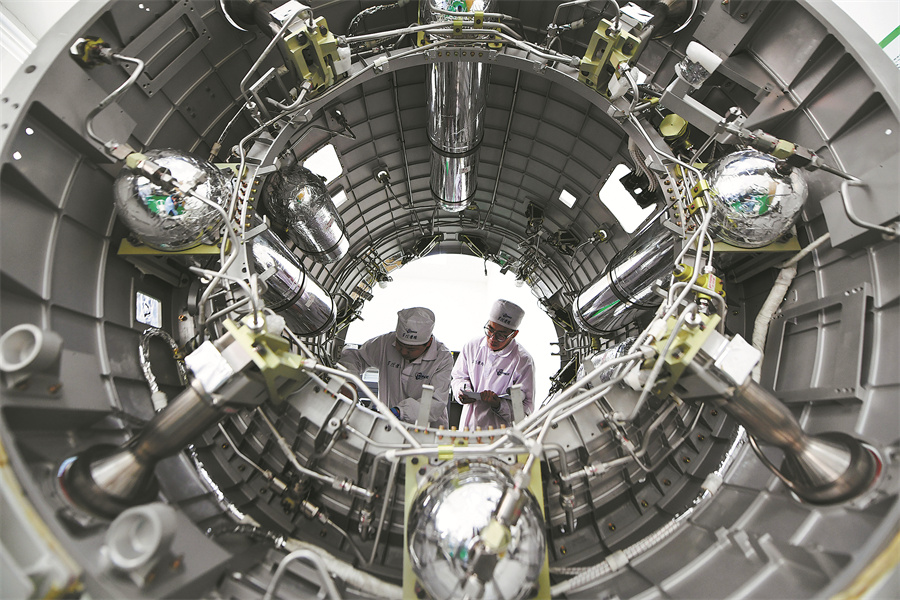Advancing new industrialization, modernization

Technicians test a high-tech power system used in space applications at a scientific company in Beijing on Feb 28. [Photo/Xinhua]
"New quality productive forces", the catchphrase that defined the recently concluded two sessions, the annual gatherings of China's top legislature and political advisory body, will signify the new growth drivers in the world's second-largest economy and seek to overcome both challenges and uncertainties, said national legislators, political advisers and industry experts.
They said the country is sharpening focus on the task of accelerating the development of new quality productive forces. This, in turn, will enhance the resilience and competitiveness of China's industrial and supply chains, advance new industrialization and inject strong impetus into the country's economic recovery.
They also called for heightened efforts to enhance independent innovation capabilities, achieve breakthroughs in core technologies in key fields by investing more in basic research and strategic emerging and future-oriented industries, and bolster industrial upgrade through the in-depth integration of cutting-edge digital technologies with the real economy.
Emphasizing the key role of innovation, the phrase "new quality productive forces" refers to advanced productivity liberated from traditional economic growth models. Such productivity is characterized by high-tech, high efficiency and high quality, and symbolizes the nation's new development philosophy.
First put forward by President Xi Jinping during his inspection tour of Heilongjiang province in September, the phrase was highlighted again at the Central Economic Work Conference in December, and became the subject of a group study session of the Political Bureau of the Communist Party of China Central Committee in January.
Xi, who is also general secretary of the CPC Central Committee, underscored the concept on March 5 while participating in a deliberation during the second session of the 14th National People's Congress, the country's top legislature, stressing that new quality productive forces should be developed based on local conditions.
NPC deputy Pan Jiaofeng, who is also president of the Institutes of Science and Development, which is part of the Chinese Academy of Sciences, said, "The development of new quality productive forces is an important focus of promoting high-quality development; these forces are playing a prominent role in the construction of a modern industrial system."
He emphasized the significance of nurturing new quality productive forces as they can bolster industrial upgrade, foster strategic emerging industries and future-oriented industries, and facilitate the development of the digital economy.
The strategic emerging industries and future-oriented industries mainly include new-generation information technology, new energy, high-end equipment, biotechnology, artificial intelligence and quantum computing.
This year's Government Work Report stated that China will give top priority to modernizing its industrial system and developing new quality productive forces at a faster pace.
The country will also give full rein to the leading role of innovation, spur industrial innovation by making innovations in science and technology and press ahead with new industrialization, in order to promote a new leap forward in the productive forces, the work report stated.
Noting that China is now in a critical period of innovation-driven development path, Pan said there is an urgent need to develop new technologies, new industries and new models to inject new momentum into its economic growth amid downward pressure.
Through the development of new quality productive forces, the country can seize the historic opportunities of a new round of global technological revolution and industrial transformation, achieve a qualitative leap in economic development, and promote industrial innovation through sci-tech innovation so as to gain a competitive edge in global competition, he said.
"The new quality productive forces are mainly driven by revolutionary technological breakthroughs, innovative allocation of production factors, and deep industrial transformation and upgrade," said Qu Yongyi, Party secretary and deputy director of the Institute of Industrial Economics, which is part of the Chinese Academy of Social Sciences. He is also a member of the 14th National Committee of the Chinese People's Political Consultative Conference, the country's top political advisory body.
"Bolstering the development of new quality productive forces is of vital importance to advance new industrialization and achieve Chinese modernization," Qu said, highlighting that sci-tech innovation serves as a key element in developing such forces.
"For traditional industries, the injection of new quality productive factors like data, and the innovative allocation of original factors of production can effectively promote the deep transformation and upgrade of industries."
Qu called for more efforts to step up investments in core technologies in key fields and solve bottleneck issues in areas like raw materials, critical components, core equipment and basic software, to boost the nation's self-reliance and strength in science and technology and speed up the building of a modern industrial system.
He also stressed the need to strengthen international cooperation in sci-tech, improve capabilities in basic research, accelerate the construction of new types of infrastructure like computing power centers and national laboratories, and deepen sci-tech system reforms to cultivate more high-quality talent.
The emphasis on strengthening sci-tech innovation, especially original and disruptive innovation, is an important part of China's broader drive to hone its science and technological prowess. China has risen to the 11th place on the 2022 Global Innovation Index of the World Intellectual Property Organization, and remains the only middle-income economy in the top 30.
Chinese high-tech manufacturing companies are playing an increasingly pivotal role in ensuring the security and stability of industrial and supply chains, strengthening the country's capacity to buffer against external risks and shocks, and nurturing new quality productive forces.
The nation will launch an initiative to pursue high-quality development of key manufacturing chains, with focus on shoring up weak links, reinforcing strengths and fostering new capabilities, the Government Work Report said.
Dong Mingzhu, chairwoman and president of Chinese home appliance maker Gree Electric Appliances, and a deputy to the 14th NPC, said it is important for manufacturing enterprises to beef up independent innovation capacities in cutting-edge technologies and continuously improve the quality of products and services to foster new quality productive forces.
She said Chinese enterprises must master core technologies as part of a broader push to promote the high-end, intelligent and green transformation of industries.
"The new quality productive forces are a combination of various capabilities in the process of promoting high-quality development," said Li Dongsheng, a deputy to the 14th NPC and founder and chairman of Chinese consumer electronics maker TCL Technology Group.
Such capacities include bolstering the transformation and upgrade of industries, pressing ahead with new industrialization, and boosting technological innovation and research and development of fundamental technologies and materials, Li noted.
He said the company will step up its push in artificial intelligence, augmented reality, virtual reality, next-generation display technology and new energy photovoltaic panels, while improving its digital and intelligent manufacturing capabilities to foster new quality productive forces.
China is the world's largest manufacturer, with its output accounting for nearly 30 percent of the global total, ranking first for 14 consecutive years, according to the Ministry of Industry and Information Technology.
"Intelligent manufacturing, which is a new type of production model formed by the deeper integration of artificial intelligence and manufacturing, is a crucial part of the new quality productive forces," said Zhong Zheng, a deputy to the 14th NPC and vice-president and chief financial officer of Midea Group, another major Chinese home appliance maker.
Zhong said China's intelligent manufacturing has developed rapidly in recent years, and become an important engine for upgrading traditional industries and fostering emerging industries, adding that sci-tech innovation is the core driving force for nurturing the new quality productive forces.
In her proposal to this year's two sessions, she called for more backing for intelligent manufacturing and acceleration of the formulation of standards and an evaluation system for the intelligent manufacturing sector.
The Government Work Report also said China will step up R&D and application of big data and AI, launch an AI Plus initiative, and build digital industry clusters with international competitiveness.
Cao Peng, chairman of e-commerce platform JD's technology committee, and a member of the 14th CPPCC National Committee, said, "Developing new quality productive forces denotes the close integration of cutting-edge computing technologies represented by cloud computing and artificial intelligence with intelligent machine equipment and a digitally savvy workforce."
Cao suggested that enterprises should combine the R&D of indigenous technologies with industrial development, especially amid the tide of AI technological innovation represented by large language models.
He also urged efforts to vigorously promote the construction of homegrown digital infrastructure, which provides powerful computing support for AI applications, and makes the deployment, training and reasoning of AI models safer and more efficient. He also stressed bolstering the digital transformation of enterprises along the industrial chains.
Faced with increasingly fierce international competition, China's emphasis on the development of new quality productive forces will help move the country's manufacturing sector up to the medium-high end of the global value chain, and consolidate the economic recovery momentum, said Pan Helin, co-director of the digital economy and financial innovation research center at Zhejiang University's International Business School.
Saying that enterprises have played a leading part in driving technological innovation, Pan called for more detailed policy measures to step up support for micro, small and medium-sized enterprises, strengthen the protection of intellectual property rights and optimize the business environment to attract capital and technology inflows.
Photos
Related Stories
- Chinese Numbers: China makes headway in developing new quality productive forces
- Chinese vice premier stresses fostering new quality productive forces
- China New Growth: China promotes large-scale equipment upgrades, trade-in of consumer goods to open up trillion-yuan market
- Nation to further expand opening-up, premier says
- Commentary: New quality productive forces crucial to China's economic landscape
- Baby boom in the Year of Dragon: New quality productive forces facilitate balanced population growth
Copyright © 2024 People's Daily Online. All Rights Reserved.









